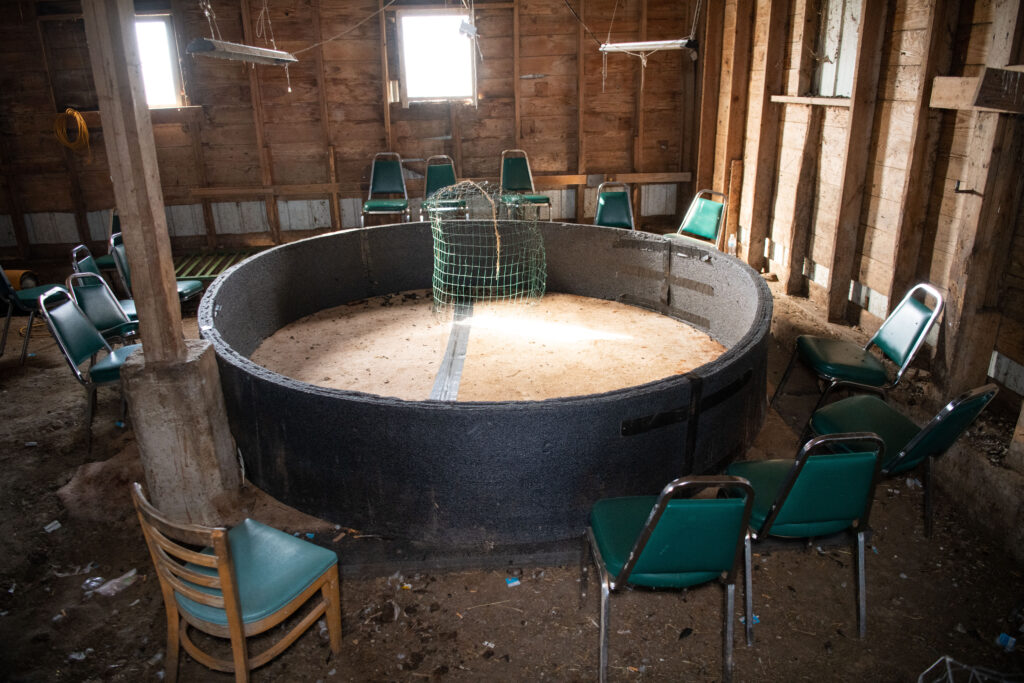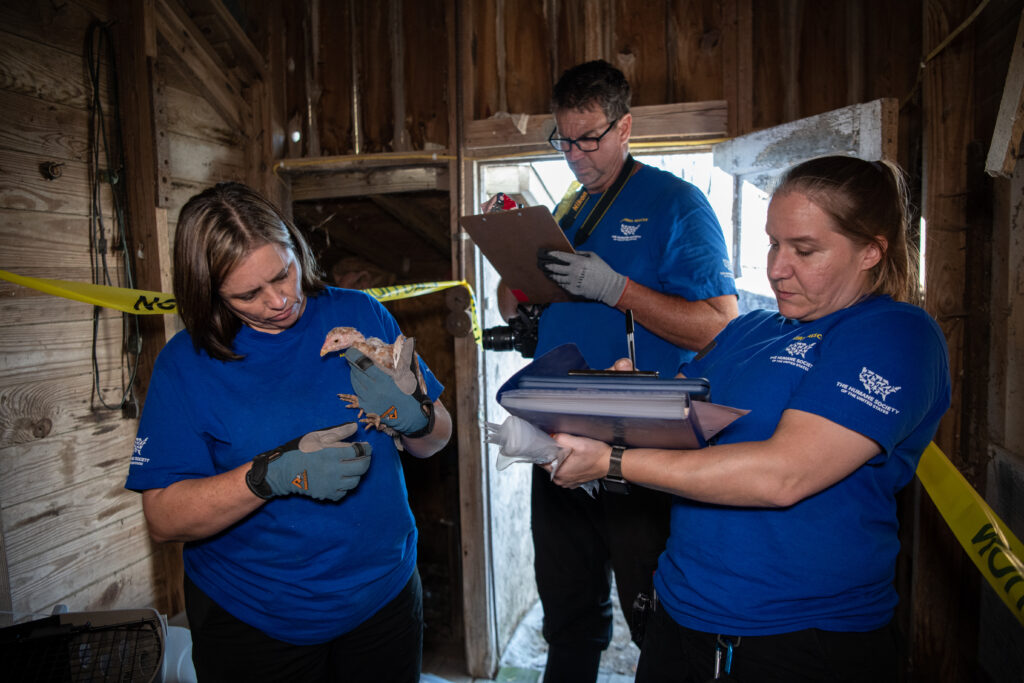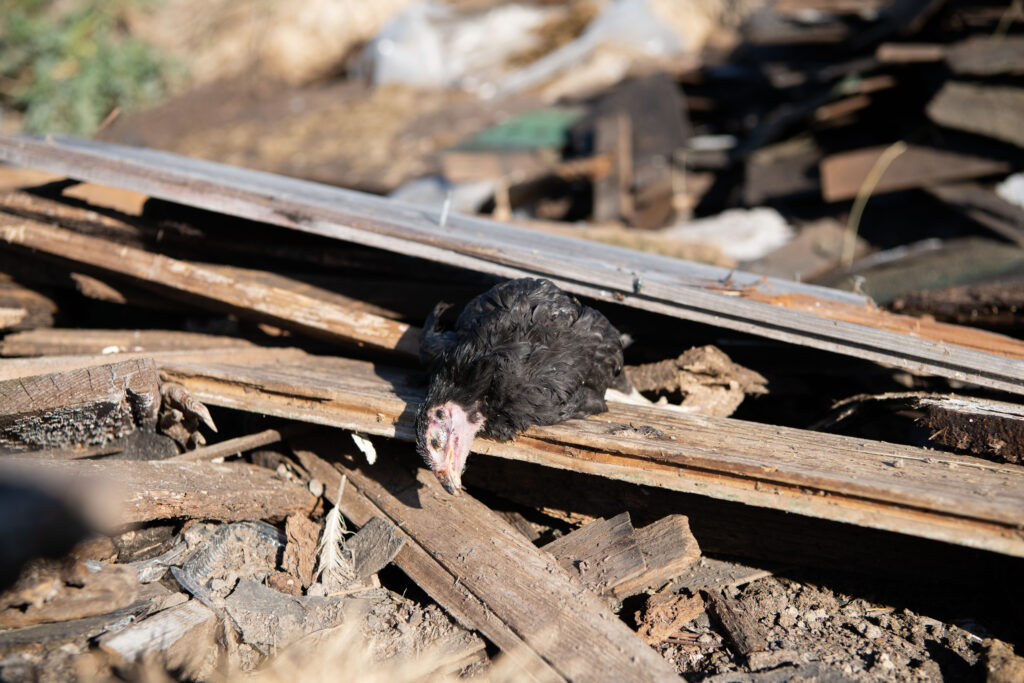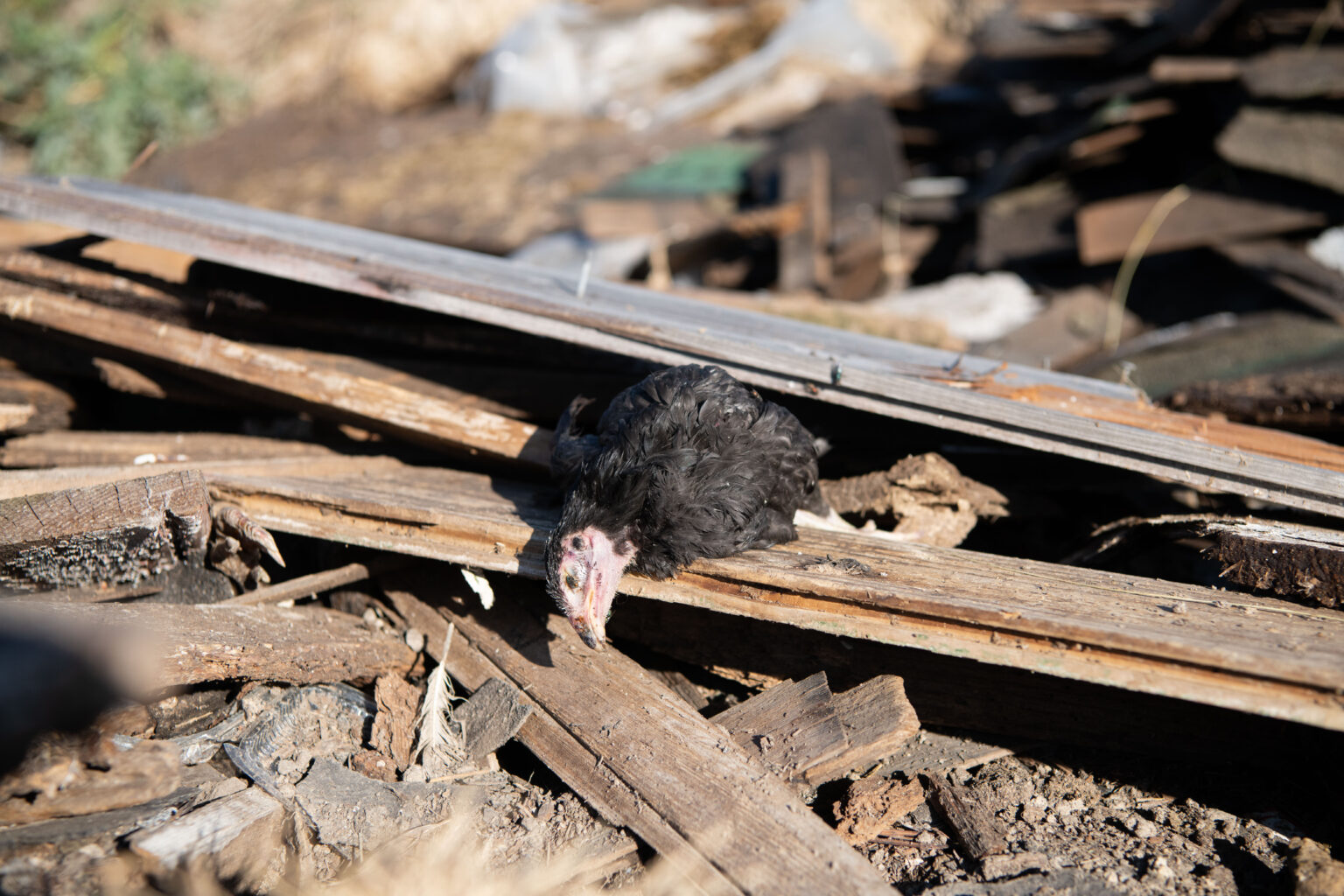Indiana’s gambling investigators regularly bust illegal animal fighting rings, but caring for the evidence — dozens or hundreds of dogs and chickens — as cases wind through the legal system is expensive and intensive.
Regulators hope forthcoming legal changes will ease the strain for the groups that pitch in: specifying that bond should include the costs of caring for animals and making it easier to euthanize those that are diseased or can’t be rehabilitated.
“My wish is that we never had to work one of these cases,” Indiana Gaming Commission Deputy Director Jenny Reske told the Capital Chronicle. “The fact that we have to go to the legislature like this is a testament to why we need to be able to do more good.”
Serving warrants throughout Indiana
Indiana’s Gaming Commission — the state’s gambling regulator — keeps tabs on casino, sports gaming and other activities that involve wagers. That work includes animal fighting, when people breed and train animals to brawl while spectators lay bets.
It’s illegal in Indiana, but still around. And it’s often tied to drug trades and other potential criminal activity, according to the commission.
The commission has worked 50 animal fighting cases in the last seven years, or about seven a year, according to General Counsel Dennis Mullen. Rings have been found in Hendricks, Owen, Morgan, Montgomery, Wells and other counties. Investigators have seized about 2,000 birds and 20 dogs in that period of time — and contributed to several convictions.
When a tip comes in, the commission’s undercover Gaming Control Unit investigates, substantiates, and works with several groups to plan the sting.
“We’ll run down every tip — and it’s a really coordinated effort,” Mullen said, listing partners: Indiana’s Board of Animal Health, local police departments or sheriff’s offices, and local prosecutors “for search warrants when it’s time to execute and go knock down doors.”

The commission also holds a no-charge contract with the Humane Society of the United States, and maintains a relationship with the American Society for the Prevention of Cruelty to Animals (ASPCA).
Both groups have helped the commission document sites for later use in legal cases: fighting pits, weapons, training equipment, housing and the animals themselves. Both have also transported and temporarily cared for animals.
“We don’t have the resources,” Mullen said of the commission.
Freeing animals — and paying for it
During a case last year in Wells County, law enforcement served the warrant not under the cover of night, but at 1 p.m.
A group of about 20 Humane Society workers toiled alongside Indianapolis Animal Care Services personnel for nearly 10 hours, Indiana State Humane Society Director Samantha Chapman said.

They documented details on the 139 roosters and hens, removed them from the premises, loaded them into cat and dog crates and hoisted them onto a horse trailer. The animals are trained into such violence that each requires individual housing.
Workers drove the chickens to a location Chapman declined to disclose, where a Humane Society-contracted veterinarian and team of technicians examined each one.
The Humane Society keeps a warehouse in Tennessee stocked with equipment and supplies, and orders remaining needs ahead of each raid.
Each operation is donor-funded. The organization’s two-year contract is recorded as costing the state a single cent.
“Anytime we do a rescue, we publicize it greatly — not only to bring awareness to the fact that cockfighting, dogfighting, these types of situations still do occur in the United States — but also to raise funds,” Chapman said: transport, veterinary care, employee time, animal feed, bedding and more.
The Humane Society maintained that shelter for several days, she said, but has done so for weeks and months in other cases.
“We believe that, in order to stop cockfighting and dogfighting, that we need to have committed agencies that are willing to prosecute people,” Chapman said. “… It’s something that we’re willing to invest in, and that our donors and supporters truly believe in.”
Asked how much a typical operation runs the organization, Chapman said, “I have no clue. I don’t even have a ballpark number.”
The cost of providing care has gone into the hundreds of thousands in past cases, according to the commission’s Mullen. And that’s complicated feasibility for some of the agency’s partners.
Legislation alters bond-setting requirements
Enter Senate Enrolled Act 423, designed in part to better match bond to costs.
State law already says that when courts set bond for the animals — because in addition to being evidence, they’re personal property — that the amount reflect “reasonable expenses.” But the legislation specifies that the term include medical care, quarantine, shelter and food.
“We’ve had several low-bond situations where the amount of bond that is set doesn’t cover the real costs,” Mullen told lawmakers in February. “The impact of this is that … local animal shelters, Humane Society of Indiana [and] the ASPCA end up footing the bill.”
If people give us a tip, we will investigate. We are very motivated to come in and shut down this activity any anytime we can.
– Indiana Gaming Commission Deputy Director Jenny Reske
“The greater impact of that is the Indiana Gaming Commission sometimes struggles to find outside agencies that are able to assist or willing to assist due to the cost and risk of impounding these animals,” he continued.
Prior to the commission’s contract with the Humane Society, it relied on the ASPCA with a contract in force 2018-2020. The relationship took a turn during the pandemic.
“I think a lot of it did have to do with how the current law was structured,” Mullen told the Capital Chronicle this month. “And one of the reasons that we pursued this change, they were just having a difficult time with the resources in this state.”
The ASPCA said it reallocated its assets.
“Due to travel restrictions and to protect the health and safety of our staff, animals and the communities we serve, we temporarily limited our field response efforts during the height of the pandemic,” the organization said in a statement. It instead distributed subsidized pet food and veterinary care to struggling pet owners and groups.
And the organization said that when it partners with states, its workers “not only provide boots-on-the-ground assistance” but also “share expertise and resources with local officials so they’re able to pursue these cases independently in the future.”
Easing euthansia
Senate Enrolled Act 423 also eases requirements for euthanasia that regulators say is too limiting and presents risks to other animals and humans.
Current law lays out bond timelines during which animals can’t be put down, and allows euthanasia only for animals suffering “extreme pain.” Board of Animal Health General Counsel Sarah Simpson said the current language is “very limiting,” while the changes “give additional discretion.”
The legislation will allow euthanasia at any time if a licensed veterinarian says the animal is a “serious threat” to other animals or people, or if it’s in the animal’s “best interest.”

Fowl in particular are usually afflicted with serious and fatal diseases, regulators and animal welfare advocates said: avian flu, campylobacter, Exotic Newcastle Disease and more.
Violence is another key concern. The birds must be isolated from one another to avoid fighting and killings, impeding efforts to place them on farms or sanctuaries.
“We do our best to place all the hens, all the chicks, and there have been occasions where we have been able to place a few roosters,” said Terry Mills, who directs blood sport investigations for the ASPCA. “I’ve seen other cases — that we’re not involved in — where they have placed roosters on large farms or sanctuaries. I don’t know how that’s working out for them.”
More often, they’re put down.
“With the 10-day hold, it just really made it difficult for us to find partners that could help us execute these major details,” Mullen said. Those partners, he added, were forced to maintain fowl for long periods of time under law despite knowing they’d ultimately be euthanized.
Multiple people noted that dogs can usually be rehabilitated, although they’re less common in Indiana’s animal fighting cases.
The legislation also gives the private professionals that do make euthanasia decisions — their state-employed counterparts don’t have that authority — civil immunity.
“These cases are often very contentious, and giving them a level of comfort [in] doing something outside of their typical scope of practice — in the public interest — I think it’s good to have that included,” Simpson said.
The veterinarians still must adhere to ethical standards under veterinary practice legislation and regulations.
“I think it comes down to: you gotta try to save what you can,” the commission’s Reske said. “Honestly, right now, we do have instances where an investigation stalls because we can’t get partners to put in all the resources.”
In timing-specific investigations built around specific events or circumstances, she said, delays mean “all of that work we’ve put in is a waste. As far as justification, we got to the point where I don’t know that we could have justified not moving forward on on this measure.”
Impounds expected to rise
House Enrolled Act 423 goes into effect July 1, like most new laws.
And it comes as the commission ramps up its involvement in such cases, according to Mullen: as people offer up more tips, officers gain more investigative experience and as other states lean on Indiana for help.
“If people give us a tip, we will investigate. We are very motivated to come in and shut down this activity any anytime we can,” Reske said.
Mullen also noted that multiple officers had been deputized by the U.S. Department of Agriculture to work on cases located outside Hoosier state, but that have ties back.
“We hear routinely … ‘Does this even happen anymore?’ You know, ‘This seems like it’s something out of a movie,’” The Humane Society’s Chapman said. “It flies under the radar. … It’s really important that the Gaming Commission and law enforcement crack down on these types of situations not only to protect animals, but really, to protect people.”
GET THE MORNING HEADLINES DELIVERED TO YOUR INBOX
